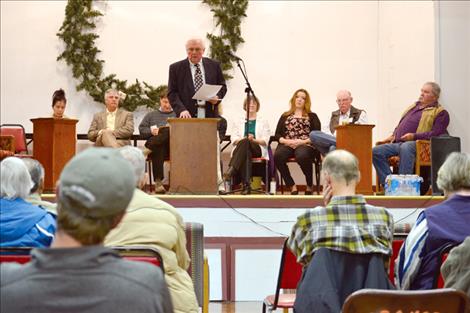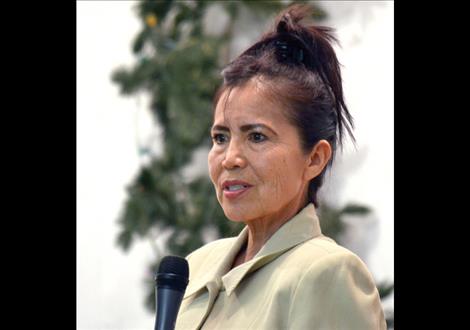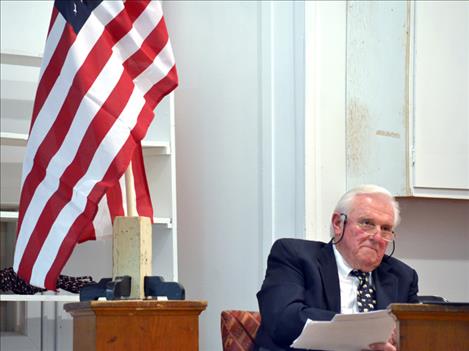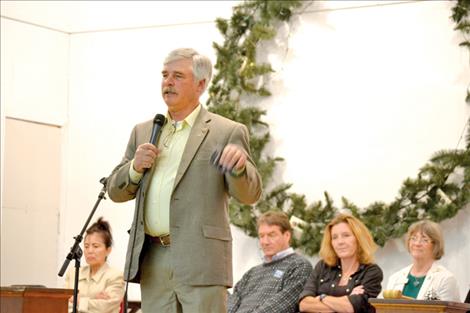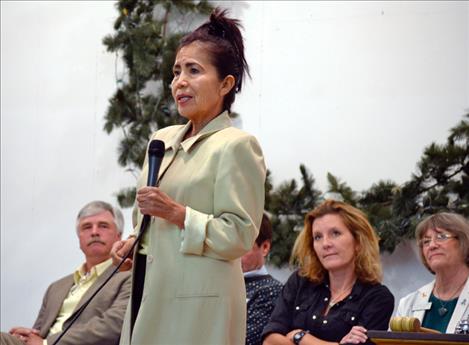Candidates share concerns at Ronan forum
Hey savvy news reader! Thanks for choosing local.
You are now reading
1 of 3 free articles.
Candidates running for state legislative seats and for one Lake County commissioner’s seat addressed an audience of about 20 people in Ronan Friday night. The event was hosted by the Round Butte Women’s Club.
Candidates for County Commissioner, incumbent Ann Brower and former commissioner Dave Stipe, were asked their interpretation of the county density map and regulations.
“The density map is very specific to newly-created parcels,” Brower said, explaining that a resident can build a structure on their 17-acre parcel they owned before the density map and regulations were established.
Brower’s position on the map is the same as how she voted: not to repeal, but have a committee to review and see what issues can be fixed.
“We know there are issues,” Brower said. “It is important that as we go forward with this committee and … this review that I am open to everyone’s opinion on these things.”
She also noted the reality on a person’s vision of “perfect” isn’t the same for everyone, but the commissioners are there to serve the residents.
Stipe said he was in office when the density map was being developed.
“The intent was to keep a fair representation of what took place when you went in to get subdivided,” he said, explaining that the regulations are not “rules.”
“The density map was never meant to turn into zoning,” he said. “What we were trying to do is mitigate the affect you have on your neighbors, and keep that conflict to a minimum.”
Yet he said current regulations are inconsistent, such as the 200 feet along minimums the Flathead lakeshore but 40 acres minimums throughout Charlo.
“I don’t agree with that,” Stipe said.
Stipe told the audience the role of a politician is to make things work out with groups that are in disagreement.
“I got too bureaucratic at the end,” he said of his last term as Commissioner. “If I get a second chance to do it right, I’m going to be the least bureaucratic commissioner you can have, legally. We should be representing the little guys.”
Susan Evans is running for House District 12. When she lost the House District 93 election in the last election cycle, she said she wasn’t all that disappointed, “because he was an honorable man. I don’t believe my opponent is being honorable. He’s lost track of his humanity.”
Because women are “the nurturing person in most households,” Evans said women are the ones who need to be addressing the issues that relate to human beings.
Evans spoke against coal in Montana, and supports turning coal careers into renewable resource careers.
“If we create 100 jobs, but that job creates 1,000 asthma cases, what’s fair about that? What’s fair about poisoning our streams and our air? We all have to breathe this air, we all have to drink this water,” Evans said. “There’s nothing clean about coal.”
Evans’ opponent Greg Hertz did not attend the forum.
As a third generation veteran with four children and a husband of 17 years, House District 93 Republican candidate Johanna Clark said they built their successful ranch from the bottom up.
Yet, “We’re looking at our budget … our checkbook … the mortgage … the cows in the field, and were trying to figure out how we are going to make it by,” Clark said. “And somewhere in the time while all of us were working so hard to make a living, our government stopped working in our best interest.”
Government was created by everyday people “doing what’s best, based on law and constitution” — and says she has a copy of the Constitution on the dash of her Toyota Tundra, and can Google it at a moment’s notice.
Clark believes people’s rights are diminishing.
“It’s time we stop sitting in recliners and complaining to our husbands, to our children, and we start setting an example by standing up,” Clark said. “We may not be the most polished, the most knowledgeable, but we need to stand up.”
HD 93 opponent John Fleming-D was not at the forum, but sent a letter that the moderator read aloud. A Vietnam veteran, Fleming was born, raised, and has resided in Mission Valley his entire life. He taught for 40 years in St. Ignatius and is a Vietnam Veteran.
“My experience and education in the 2009 legislature … will help me work with wide range of people and ideas to help solve Montana’s issues,” he wrote. “Although our schools, prisons and health needs continue to rise, we must remember cutting taxes for families and small businesses benefits our state’s business and climate.”
Energy issues are going to important in the next legislative session, according to Fleming.
“The problems of climate change and carbon based energy … must be dealt with proactively,” he said.
Because of his teaching background, Fleming wrote that he can offer a broad range of experience in working with education issues and the communities. He believes it’s important to continue funding schools, including facilities and maintenance.
“Investing in our children is the best investment we can make,” he said.
Senate District 47 Democratic candidate Tom Franks of Missoula is running against Joey Jayne-D of Arlee in the June 7 primary election. The winner will face current Republican HD 93 incumbent Dan Salomon, who is running for SD 47 in the November election.
The new senate district runs from Reservoir Road in Polson south to the railroad tracks in Missoula.
Franks said he has been involved in civic work all of his adult life.
“Contributing to our community, our state, our government and volunteer organizations is important part of being a good citizen,” he said. “This is a point in life where I could serve in a little different way, and that’s running for the state legislature.”
Making government work better is really what the legislature is all about, he said. Education is a key in economic structure.
Franks believes Montana’s environment is one of the state’s most viable economic assets, and he supports using natural resources in wise, effective and sustainable ways. For instance, when he worked with the National Wildlife Federation, they found “good ways to move forward with logging projects and timber harvest in a way that ensures that fish and wildlife habitat is protected.”
Franks said the agriculture industry should also be compensated and rewarded for good conservation and stewardship.
“I am very, very optimistic about the future of Montana,” he said.
Jayne lives on a ranch and works cattle, “So I know all about picking rocks, pulling calves. Based on that, I’m a strong advocate to make sure our livestock and cattle are protected.”
Jayne served in the state legislature from 2001-2008, and helped shape the proposed budget in the Appropriations Committee.
“I believe that based on my exp as a state leg, that I will hit the roads running. I don’t have to figure out what to do.”
She said she has a history of reading all the bills of not increasing taxes or increasing fees.
With only 50 state senators compared to 100 people in the legislature, “there’s no time limit when you talk on the floor,” Jayne said “I kind of like that.”
With about 52 miles of SD 47 covering the Flathead Indian Reservation, jobs are Jayne’s high priority, claiming the unemployment rate on the reservation is upwards of 40 percent. “Teacher salaries are almost at the bottom of the barrel,” she noted.
Born and raised in Ronan, Salomon served on the education committee for three terms in the House and on Ronan School Board for 13 years. His top issues include jobs, education, natural resource and gun rights.
“I’m a strong supporter of second amendment rights,” Salomon said. “The only reason they dinged me is because I don’t like kids bringing weapons to school, so we killed that bill three times … and my rating went down.”
Salomon is a pro-life supporter, and a strong proponent of the Confederated Salish and Kootenai-Montana Water compact.
“It does so many things for Montana. It brings in 90,000 acre-feet of water that we can’t get anywhere else … That’s a forever deal,” he said. “If you drive from Missoula to Polson, look a mile on each side of the road, and cover that with a foot of water, that’s how much new water we get. That is a big deal for Montana. That’s Montana’s future … That is the biggest protection that we could possibly get for this valley.”
Senate District 6 candidates Rolf Hamsen-D and Albert Olszewski-R did not attend the forum.















